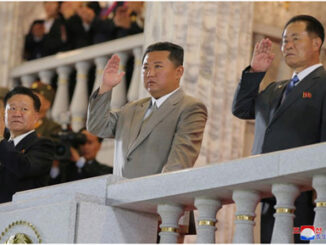
TEHRAN (TIP): Seventy years after a CIA-orchestrated coup toppled Iran‘s prime minister, its legacy remains both contentious and complicated for the Islamic Republic as tensions stay high with the United States.
While highlighted as a symbol of Western imperialism by Iran’s theocracy, the coup unseating Prime Minister Mohammad Mossadegh — over America’s fears about a possible tilt toward the Soviet Union and the loss of Iranian crude oil — appeared backed at the time by the country’s leading Shiite clergy.
But nowadays, hard-line Iranian state television airs repeated segments describing the coup as showing how America can’t be trusted, while authorities bar the public from visiting Mossadegh’s grave in a village outside of Tehran.
Such conflicts are common in Iran, where “Death to America” can still be heard at August 25 prayers in Tehran while many on its streets say they’d welcome a better relationship with the U.S. But as memories of the coup further fade away along with those alive during it, controlling which allegory Iranians see in it has grown more important for both the country’s government and its people.
“Maybe the U.S. did this out of fear of the emerging power of the Soviet Union, but it was like wishing for an earthquake to get rid of a bad neighbor,” said Rana, a 24-year-old painter who like some others who spoke to The Associated Press gave only her first name for fear of reprisals. For Iranians, “the rancor has never melted.”
The August 1953 coup stemmed from U.S. fears over the Soviet Union increasingly wanting a piece of Iran as Communists agitated within the country. The ground had been laid partially by the British, who wanted to wrest back access to the Iranian oil industry, which had been nationalized earlier by Mossadegh.
Though looking initially like it failed, the coup toppled Mossadegh and cemented the power of Shah Mohammad Reza Pahlavi. It also lit the fuse for the 1979 Islamic Revolution, which saw the fatally ill shah flee Iran and Ayatollah Ruhollah Khomeini usher in the theocracy that still governs the country.
Today, several who spoke to the AP about the coup and possible relations with the U.S. put it in the context of Iran’s ailing economy, which has been battered by years of sanctions after the collapse of its 2015 nuclear deal with world powers.
Lower tensions with the U.S. “will bring more money for my business,” said Hossein, 47, who runs a canteen for cab drivers in southern Tehran. “Now taxi drivers spend less compared to the past years and it is because of these bad relations, sanctions.”
“I know about this bitter history but it should come to end sometime soon,” added Majid Shamsi, who works as a parcel carrier in central Tehran. “Young people in Iran seek a better life and it cannot come as a result of enmity with” the U.S.
Even during increasingly common protests by teachers, farmers and others in Iran, some of the regular chants include: “Our enemy is here; they lied to us (that the enemy) is the U.S.”
“Iran today should accept a deal with the U.S. like what it did to release dual nationals,” added teacher Reza Seifi, 26. “I need it for my better future, for a better future for all.”
But like with the exchanges with the U.S., there are limits to how far Iran’s government will go in remembering Mossadegh.
Last weekend, State television’s English-language Press TV aired a segment with a journalist standing on Mossadegh Street in northern Tehran. However, over the last 20 years, police have restricted access to those wanting to visit his grave in his ancestral home in the village of Ahmadabad, some 90 kilometers (55 miles) northwest of Tehran. In the village, tall walls and a locked gate keep those wanting to pay their respects out, while officers question those who look like they don’t live there.
Some found other ways to mark the 70th anniversary of the coup.
“I could not go to his grave to pay tribute but I have visited the graves of his supporters and allies like Hossein Fatemi,“ said Ebrahim Nazeri, 32, as he, his wife and two children stood at the graveside of Fatemi, Mossadegh’s foreign minister who was executed after the coup. “He was a hero like Mossadegh.”
Another visitor to Fatemi’s grave, teacher Ehsan Rahmani simply said that “the U.S. planted hatred in the hearts of Iranians” through the coup. (AP)





Be the first to comment